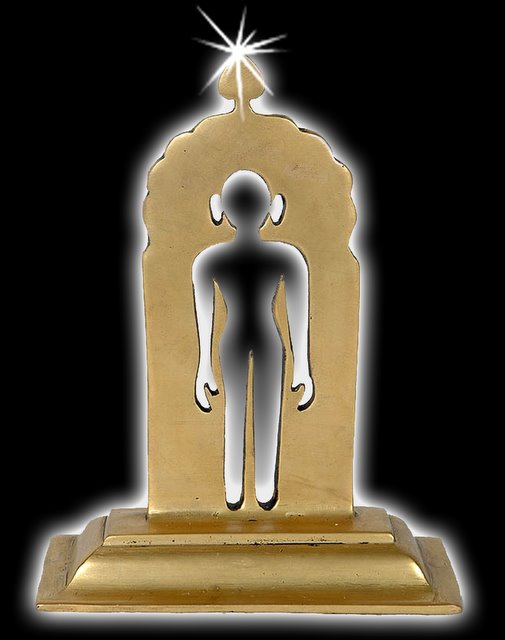|
Arihantas
''Arihant'' (, ) is a jiva (soul) who has conquered inner passions such as attachment, anger, pride and greed. Having destroyed four inimical karmas, they realize pure self. ''Arihants'' are also called ''kevalins'' (omniscient beings) as they possess '' kevala jnana'' (pure infinite knowledge). An ''arihant'' is also called a ''jina'' ("victor"). At the end of their life, ''arihants'' destroy remaining ''karmas'' and attain ''moksha'' (liberation) and become '' siddhas''. ''Arihantas'' have a body while ''siddhas'' are bodiless pure spirit. The Ṇamōkāra mantra, the fundamental prayer dedicated to ''Pañca-Parameṣṭhi'' (five supreme beings), begins with ''Ṇamō arihantāṇaṁ'', "obeisance to the arihants". ''Kevalins'' - omniscient beings - are said to be of two kinds # ''Tirthankara kevalī'': 24 human spiritual guides who after attaining omniscience teach the path to salvation. # ''Sāmānya kevalī'': ''Kevalins'' who are concerned with their own liberatio ... [...More Info...] [...Related Items...] OR: [Wikipedia] [Google] [Baidu] |
God In Jainism
In Jainism, godliness is said to be the inherent quality of every soul. This quality, however, is subdued by the soul's association with karmic matter. All souls who have achieved the natural state of unlimited bliss, unlimited knowledge ('' kevala jnana''), unlimited power and unlimited perception are regarded as God in Jainism. Jainism rejects the idea of a creator deity responsible for this universe's manifestation, creation, or maintenance. Instead, souls (in this case, ''devis'' or ''devas'') who have reached Heaven for their merits and deeds influence the Universe for a fixed period until they undergo reincarnation and continue the cycle of enlightenment. According to Jain doctrine, the universe and its constituents (namely, soul, matter, space, time, and principles of motion) have always existed. All constituents and actions are governed by universal natural laws and a "perfect soul" (an immaterial entity that cannot create or affect a material entity like the unive ... [...More Info...] [...Related Items...] OR: [Wikipedia] [Google] [Baidu] |
Siddha
''Siddha'' (Sanskrit: '; "perfected one") is a term that is used widely in Indian religions and culture. It means "one who is accomplished." It refers to perfected masters who have achieved a high degree of perfection of the intellect as well as moksha, liberation or Enlightenment in Buddhism, enlightenment. In Jainism, the term is used to refer to the liberated souls. ''Siddha'' may also refer to one who has attained a siddhi, paranormal capabilities. Siddhas may broadly refer to siddhars, naths, asceticism, ascetics, sadhus, or yogis because they all practice sādhanā. Jainism In Jainism, the term ''siddha'' is used to refer the liberated souls who have destroyed all Karma in Jainism, karmas and have obtained Moksha (Jainism), moksha.They are free from the transmigratory cycle of birth and death (''Saṃsāra (Jainism), saṃsāra'') and are above ''Arihant (Jainism), Arihantas'' (omniscient beings). Siddhas do not have a body; they are soul in its purest form. They r ... [...More Info...] [...Related Items...] OR: [Wikipedia] [Google] [Baidu] |
Lord Risbabhdev Moving Over Golden Lotus After Attaining Omniscience
Lord is an appellation for a person or deity who has authority, control, or power over others, acting as a master, chief, or ruler. The appellation can also denote certain persons who hold a title of the peerage in the United Kingdom, or are entitled to courtesy titles. The collective "Lords" can refer to a group or body of peers. Etymology According to the ''Oxford Dictionary of English'', the etymology of the word can be traced back to the Old English word ''hlāford'' which originated from ''hlāfweard'' meaning "loaf-ward" or "bread-keeper", reflecting the Germanic tribal custom of a chieftain providing food for his followers. The appellation "lord" is primarily applied to men, while for women the appellation "lady" is used. This is no longer universal: the Lord of Mann, a title previously held by the Queen of the United Kingdom, and female Lords Mayor are examples of women who are styled as "Lord". Historical usage Feudalism Under the feudal system, "lord" had a wi ... [...More Info...] [...Related Items...] OR: [Wikipedia] [Google] [Baidu] |
Vardhaman Keezhakuyilkudi
Mahavira (Devanagari: महावीर, ), also known as Vardhamana (Devanagari: वर्धमान, ), was the 24th ''Tirthankara'' (Supreme Preacher and Ford Maker) of Jainism. Although the dates and most historical details of his life are uncertain and varies by Jain schools and branches, sect, historians generally consider that he lived during the 6th or 5th century BCE, reviving and reforming a proto-Jain community (which had possibly been founded by Pārśvanātha), and that he was an older contemporary of The Buddha, Gautama Buddha. Jains regard him as the spiritual successor of the 23rd ''Tirthankara'' Parshvanatha. According to traditional legends and hagiography, hagiographies, Mahavira was born in the early 6th century BCE to a royal Kshatriya Jain family of ancient India. His mother's name was Trishala and his father's name was Siddhartha of Kundagrama, Siddhartha. According to the second chapter of the Śvētāmbara Ācārāṅga Sūtra, Siddhartha and his f ... [...More Info...] [...Related Items...] OR: [Wikipedia] [Google] [Baidu] |




